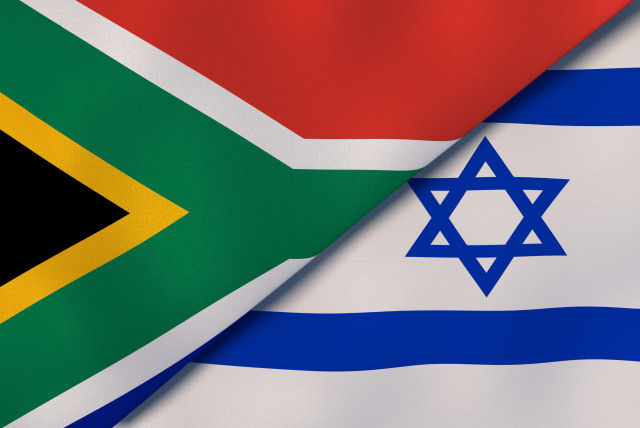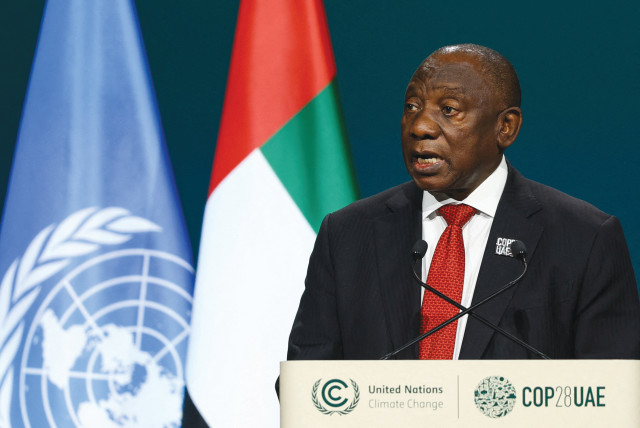Israel, South Africa trade barbs on eve of ICJ Gaza genocide case

The ICJ will hold sessions on Thursday and Friday in a case brought in late December accusing Israel of failing to uphold its obligations under the 1948 Genocide Convention.
South Africa and Israel exchanged allegations on the eve of hearings at the top UN court which will hear South African claims that Israel is committing genocide against Palestinians in its Gaza offensive.
The International Court of Justice (ICJ) in The Hague, also known as the World Court, will hold sessions on Thursday and Friday in a case brought in late December accusing Israel of failing to uphold its obligations under the 1948 Genocide Convention.
Both countries are parties to the convention, which obliges them to not commit genocide and also to prevent and punish it. The treaty defines genocide as "acts committed with intent to destroy, in whole or in part, a national, ethnical, racial or religious group."
The politically-charged hearings will deal exclusively with South Africa's request for emergency measures ordering Israel to suspend its military actions in Gaza while the court hears the merits of the case - a process which could take years.
"Our opposition to the ongoing slaughter of the people of Gaza has driven us as a country to approach the ICJ," South African President Cyril Ramaphosa said on Wednesday.
"As a people who once tasted the bitter fruits of dispossession, discrimination, racism and state-sponsored violence, we are clear that we will stand on the right side of history," he said.
Israeli government spokesperson Eylon Levy said on Wednesday, "Tomorrow, the State of Israel will appear before the International Court of Justice to dispel South Africa's absurd blood libel, as Pretoria gives political and legal cover to the Hamas Rapist Regime."
"On October 7, Hamas committed an act of genocide when it sent death squads to invade Israel with the mission of burning, beheading, torturing, mutilating, abducting, and raping as many Israelis as they could, as brutally as they could. It was a campaign of systematic extermination that they have vowed to continue... until our country is destroyed. We are fighting to bring the October 7 monsters to justice because 'Never Again' is now."
'Committing genocide'
Israel launched its offensive after Hamas fighters carried out an Oct. 7 cross-border rampage in which Israel says 1,200 people were killed and 240 abducted.
Since then, Israeli forces have laid much of the enclave to waste, and nearly all its 2.3 million people have been driven from their homes at least once, causing a humanitarian catastrophe.
In a 84-page filing, South Africa cites Israel's failure to provide essential food, water, medicine, fuel, shelter and other humanitarian assistance to the Gaza strip.
It also points to the sustained bombing campaign which has destroyed hundreds of thousands of houses, forced the evacuation of some 1.9 million Palestinians and killed over 23,000 people according to Gaza health authorities.
Israel says it has been encouraging limitless humanitarian imports across Egypt's border with the Palestinian enclave and evacuations were aimed at removing civilians from harm's way and they can eventually return.
A panel of 17 judges, including one ad hoc justice each from Israel and South Africa, will hear three hours of arguments from each side. A ruling on the provisional measures was expected later this month. The ICJ's rulings are binding but the court has no way to enforce them.
In a sign of the weight the term genocide carries, Israel was sending a former Supreme Court justice who survived the Holocaust which preceded the Genocide Convention to be its ad hoc judge. South Africa appointed a judge who as a youth was sent for ten years to Robben Island where he met former South African president Nelson Mandela.
A different court in The Hague, the International Criminal Court (ICC), is separately investigating alleged atrocities in Gaza and the West Bank and the Oct. 7 attacks in Israel, but has not named any suspects. Israel is not a member of the ICC and rejects its jurisdiction.
Jerusalem Post Store
`; document.getElementById("linkPremium").innerHTML = cont; var divWithLink = document.getElementById("premium-link"); if (divWithLink !== null && divWithLink !== 'undefined') { divWithLink.style.border = "solid 1px #cb0f3e"; divWithLink.style.textAlign = "center"; divWithLink.style.marginBottom = "15px"; divWithLink.style.marginTop = "15px"; divWithLink.style.width = "100%"; divWithLink.style.backgroundColor = "#122952"; divWithLink.style.color = "#ffffff"; divWithLink.style.lineHeight = "1.5"; } } (function (v, i) { });

